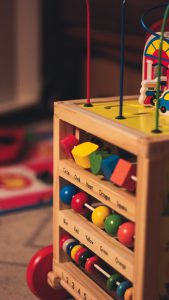What my 4-year-old is learning about money

People often ask me, “When should I start to teach my children about money?” Much to their surprise, my answer is, “When they’re old enough to count.” If we think about it, most parents teach life-long habits to their kids at an early age. We don’t wait until they’re 18 to teach them manners and we don’t wait until they hit 13 to teach them to pick up after themselves. Can you imagine the burden you would have if you had to pick up after them for the first 13 years of their lives?! Similarly, we don’t want to be financially responsible for them well into adulthood. Get them started when they’re young and help set them up for life.
So just how do you start the lessons? The answer is slowly, simply and consistently. As your kids learn to count, have them count your coins. They may not fully understand the value of the coins, but that’s OK; that will come later. Get your child a little change purse or a piggy bank. Help them put the coins away so they begin to understand that money is important and you have to store it carefully.
As they get a bit older and receive money as gifts or for doing chores, help them set a goal, such as saving for a book or a toy. Show them how they can divide their money into spending and saving categories. Tell them when they have enough spending money for the item they want, then go to the store together to purchase it.
As your kids get older you can have them think about splitting their money into more categories:
- Spending – this is money for something they might get that week, such as a treat.
- Saving – this is for something that may be more valuable and require more time to save up for, such as a bike, or something longer-term, like their post-secondary education.
- Investing – this may seem out of scope for kids, but it’s never too early to start saving for a car, a home or retirement.
- Sharing – when we find ourselves in a fortunate situation it is a good idea to turn to our neighbours and see how we might help them. Pick a charity or organization that is important to your child, perhaps helping to feed the homeless, protecting an animal or contributing to a specific environmental initiative.
To help guide your money conversations, try a simple activity from Make It Count: A Parent’s Guide to Youth Money Management.
– Ainsley Cunningham
Founder and Project Coordinator, MoneySmart Manitoba
Manager, Education & Communications, Manitoba Financial Services Agency
Share this article




Leave a Reply